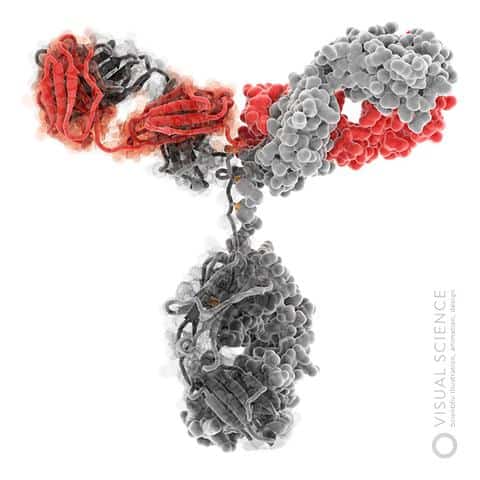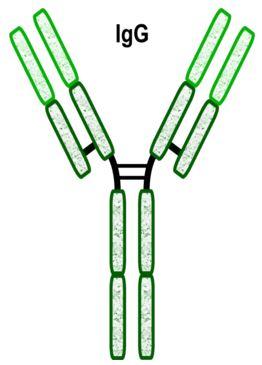We’ve talked at length about gut health basics. We’ve highlighted the 4 “Pillars of Gut Health”. We’ve discussed probiotics a bunch. We’ve even now discussed prebiotics or the role of collagen in gut health.You’d figure there’s nothing left to talk about. Not by a long shot!
The gut health topics we’ve covered to date are just the basics. They’re the things EVERYONE should be doing to have healthy guts. What about those of us with more advanced problems? What supplements could we use to turn the tides in the war for our GI tract? What if the basics aren’t enough?
Being a pharmacist, I have access to supplements that traditional health food stores won’t. These are sophisticated formulas and ingredients that can do amazing things for the right people. Today, we’ll discuss an ingredient we use all the time for great gut health in those who truly need the extra help.
Let’s Talk Immunoglobulins
Do you remember when I told you the immune system is a super complex thing? I’ll say it again: It is extremely complex. One complex part of the immune system are protein compounds called immunoglobulins. Get used to saying that in your head, as I mention that word about 1000 more times here today. Visual Science has an awesome image of an immunoglobulin that even plays in 3d. Here’s the image:

Source: Visual Science
Drawing that would be silly every time we wanted to talk about it, so immunoglobulins are represented by these Y-shaped figures:

The purpose of an immunoglobulin is kind of the same as one of those boots they put on your car when you don’t pay your parking tickets. Your car becomes disabled. It is pretty evident to the tow company which car should be hauled away because of the big, obvious thing attached to it.
An immunoglobulin will:
- Attach to foreign cells like bacteria. The tippy top of the Y shape can bind to proteins and such on the surface of invaders. This disables them; they can’t reproduce. It also marks them for removal by other immune cells that literally will come around gobble up the “tagged” invader, immunoglobulin and all.
- Attach to foreign toxins and compounds secreted by other microbes. Part of the problem with “bad” bacteria and microbes are the stuff they secrete to “mark their territory.” The immunoglobulin can act as a vacuum, sucking up all the gunk, preventing it from irritating our cells.
- Signal to other immune system pathways to send more help.
Immunoglobulins are important. We have lots of different types of immunoglobulins. Some are specific to allergies, some to invaders, and some are custom to specific colds we had once when we were 9. Your “learned” immune system creates immunoglobulins to respond quicker if you ever get that same version of a cold at any point in your life. A human can make up to 10 billion unique immunoglobulins over their lifetimes.
“What does this have to do with my belly?” says the reader who is growing frustrated saying immunoglobulin to themselves over and over. Immunoglobulins are secreted into the bloodstream, into our tissues, and into the tube of our GI tract. Over 80% of all infectious disease starts in our respiratory tract or our gut. There, they bind with pathogens – disease causing microbes – preventing them from growing, spreading, and causing damage. Immunoglobulins are a part of a complicated system to help prevent disease, starting right in your gut!
We make immunoglobulins all day long and secrete about a teaspoonful into the GI tract every day. I stress adequate protein intake because we need these macronutrients to make important stuff like immunoglobulins, not just to help build muscle.
It wasn’t always the case that we made all the immunoglobulins we need. Immunoglobulins have and always will come from our diet – in one way or another.
Dietary Sources of Immunoglobulins
When you were a newborn, you didn’t have much of an immune system or fashion sense. Mom helped you out with both.
Breast milk, especially the early secretions called colostrum, is rich in immunoglobulins. By drinking breast milk, newborns are getting a jump started immune system. The immunoglobulins help prevent infection in the respiratory and GI tract.
Immunoglobulins are strong. They survive the harsh environment of the stomach. Even if not created by you, ingested immunoglobulins will bind to disease-causing microbes and their gross, toxic secretions.
This is an important point. It is good to ingest foods that have naturally occurring immunoglobulins. Dietary (or supplemented) immunoglobulins survive the GI tract and help support your natural immunity against pathogens, keeping your gut healthy.
Breastfeeding isn’t very convenient for most of us at this point in our lives. You may have stopped breastfeeding over 4-8 decades ago, but you still technically ingest breast milk. Just not human breast milk. Cow colostrum is VERY rich in immunoglobulins, so if you are a raw milk person, you’re getting a good dose of immune-supporting compounds.
Otherwise, people who eat whey or a well-made whey protein like Myocep are ingesting naturally occurring immunoglobulins. This is a key distinction I make between Myocep and the other products out there on the market; whey protein shouldn’t be just about protein, but about the immunoglobulins and immune-benefiting compounds found in whey itself. Whey protein powders should be as close to “whole food” or minimally processed as possible.
Our Vital Protein Plus has added immunoglobulins, so plant-protein eaters can get natural immunoglobulins as well, though that product is not vegan as it contains milk.
Eggs contain an immunoglobulin similar to those found in milk. The problem is cooking eggs will destroy those immune-healthy compounds. Good news for you raw cookie dough eaters – you’re strengthening your immune system! Not really… please don’t ingest cookie dough for immune health!
The types of immunoglobulins we’ve talked about are naturally occurring ones. We can get more aggressive, cultivating concentrates of immunoglobulins that will target specific pathogens. Having access to these is a strong advantage of Woodstock Vitamins. Let’s explore those options.
Targeted Immunoglobulin as a Supplement
Any immunoglobulin supplement will have some health benefit, whether they are naturally occuring like whey or colostrum, or the targeted one’s we’ll discuss next. That is, only if they are properly made supplements.
I make this distinction because the natural products industry kinda sucks sometimes. If whey, colostrum, or any other raw ingredient were over-processed, like via heat like when we cook eggs, the immunoglobulin compounds would degrade. Animals are sources of the raw materials typically, so they should be treated well. They don’t need to go to a spa and get their nails done, but they should be treated ethically, fed properly, and be antibiotic and hormone free at least. Immunoglobulin supplements we carry meet or exceed our standards for all of this.
To set the stage for “targeted” immunoglobulins, let’s review what we’ve learned.
Immunoglobulins are healthy things to ingest. Our goal is to use immunoglobulins to improve our immune health, especially in the gut. To get that benefit, we COULD use regular colostrum or whey, but the protection against the baddies would be limited to the the antibodies developed by the animal we are sourcing from. If a cow was never exposed to E coli, for example, the immunoglobulins won’t be very helpful against that.
On top of this, colostrum and whey contains a small percentage of immunoglobulins. The rest are other proteins and things like growth factors or lactoferrin. To use colostrum for the immunoglobulins, you’d have to take a bunch of it.
Hyperimmune milk or eggs are a unique product that are rich in immunoglobulins that are targeted against specific human pathogens.
What is “hyperimmune” egg or milk? It’s an interesting method of harvesting antibodies developed around the 1890s.
Here’s how it works:
If cows or chickens are immunized against things like E. coli or Pseudomonas, they’ll build a large concentration of antibodies against those diseases. Those antibodies end up in the eggs. We can pick LOTS of pathogens – up to 26 in one case – and the resulting milk or egg will be referred to as “hyperimmune”, as they will be rich in the immunoglobulins that protect against those disease-causing microbes. So it’s a double win: the animals are protected from disease and we can eat the eggs or drink the milk and get added protection from those pathogens.
We have a hyperimmune egg concentrate that has antibodies against 26 different strains of pathogens. Here’s a quick version of the list:
- Shigella
- E. coli
- Salmonella
- Pseudomonas
- Klebsiella
- H. flu
- A bunch of Strep and Staph pathogenic strains
So traditional sources of immunoglobulins will be rather generic. Hyperimmune milk or egg will be targeted against specific disease-causing pathogens. Colostrum, whey, and plain immunoglobulins have health benefits. Hyperimmune egg or milk have pretty awesome specific benefits, especially in the GI tract.
So imagine you have inflammation in your gut. The protective factors keeping your gut integrity start to diminish. The good bacteria start to die off and bad bacteria start to thrive. Immunoglobulins, along with probiotics, will help replenish the good bacteria and bind up any bad guys that are getting aggressive. Add to that a prebiotic like arabinogalactin (which starves out bad bacteria and feeds good bacteria), and you have a trifecta of gut health compounds.
The Health Benefits of Immunoglobulins
In recent years, data of added immunoglobulins impact on human health has been accumulating. I try not to get too into the weeds in these articles about medical claims. The data changes quite rapidly and I don’t want to spend half the day updating blogs from years ago!
In general, here are some things immunoglobulins and hyperimmune egg or milk have shown positive results:
- Athletic performance
- Inflammatory bowel conditions
- Travel-diarrhea support
- Oral health
We have a list of studies if you wanted specific data on specific conditions – just ask)!
Recommended doses are between 2 and 5g of hyperimmune egg daily. Some studies in athletes used upwards of 20 grams (4 teaspoons) of colostrum. We recommend starting low and slowly increasing until effect.
Vitality Approved Immunoglobulin Supplements
A quick nerd note: Immunoglobulin is written shorthand as Ig (I know, I could have been using that shorthand all along…). That will make the next part easier.
Here are the immunoglobulin rich products we’ve vetted and feel exceed our quality standards:
GI Immune Plus – IgY plus our favorite prebiotic arabinogalactan. So the IgY binds up the bad stuff while the prebiotic feeds the good microbes and starves out many of the pathogens. This is one of my favorite products we sell!
GI Immune – IgY in a powder or capsule. Pair this with Prebio Complete for a DIY GI Immune Plus.
If you are looking for a product to further support GI health, look first to GI Immune Plus. It is IgY with a prebiotic, so there are tremendous savings in the combination over buying the ingredients separately.
Who Should Not Use These Types of Products
These aren’t for everyone. If you have an allergy to milk or eggs, you’ll want to avoid these immunoglobulin products. While vegetarians who consume eggs or milk could use these products, there are no vegan sources of IgG or IgY.
Another Tool In The War For Your Gut
Immunoglobulins, especially hyperimmune egg or milk, can be a valuable supplement to improve and support your health.
Great guts start with the basics: fluids, fiber, probiotics, and prebiotics. From there, unique products such as GI Immune or GI Immune Plus can give you the upper hand against the bad guys trying to set up shop in your gut.
Immunoglobulins are not all equal and not right for everyone. We offer wellness consults to get a good picture of your health and to help you determine if they are a good fit for you.
Just trying to keep it real…

Neal Smoller, PharmD
Owner, Pharmacist, Big Mouth



